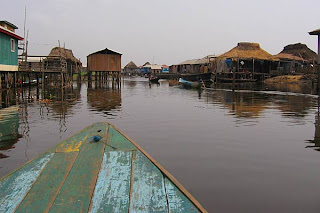
Accessible only by boat... a dug out wooden canoe, to be specific, that you must row - by hand - Nzulezo, is a community of more than 500 people who live in "The Village on Water", located in South Western Ghana.
Let me just say: Rowing a canoe for an hour is hard work! I even have blisters on my thumbs as evidence of my hard physical labor! Haha.

The stilt village was an amazing sight! It's something that is hard to imagine still exists is 2009... but then again, this is Africa.
After crossing Lake Amansuri, my guide, Samuel instructs me that if I want to take pictures of any person I must ask them first.
The reaction of the village people shocked me a little bit. They weren't very inviting. While I understand that it is their home, it is also a tourist attraction that thousands of people come to each year, so I was expecting them to be friendly.
In the end, I cut my losses and didn't take any pictures of the people. I saved myself the rejection!
The history of the village dates back 400+ years ago when people from Mali and Senegal were feuding. The Malian's fled and built the village on water to protect themselves from the enemies. While the feuds have subsided, the people still choose to live out on the water. For mere convenience of having a home already established, maybe? Life is simpler out on the water?
There was a primary school on site which was staffed by a member of the village. I wonder if they have had any formal education? Unlikely. Absolutely no computers or games for the students. But then again- it's obviously not necessary for them, and not a priority.
A Catholic church sat at the end of the row of houses held above water on tall stilts. My guide told me that while most of the people have accepted Christianity, some still believe in their own gods.
When a baby is born in the community, the child is dipped into the lake three times. Once the baby can crawl along the wooden planks that connect the houses and pass over the lake, the baby will see it's shadow and crawl back to safety. My guide said that for as long as the village has been in existence, a baby has never fallen in!
As for electricity, the community operates on car batteries and generators.
I was very curious about what kind of jobs the people had, where they got their food, and who could live in the village. Could anyone just move in?
From the minimal explanations I received, I was able to obtain the following answers:
Most of the people are farmers. They grow a lot of their own food, or will row to the village an hour away to buy additional supplies.
You must ask the chief if you are interested in living in the village and must "meet certain criteria".
Experiencing such an unusual way living was really neat. I'm glad I made the 7 hour trek to see another aspect of Ghana! A great weekend!

